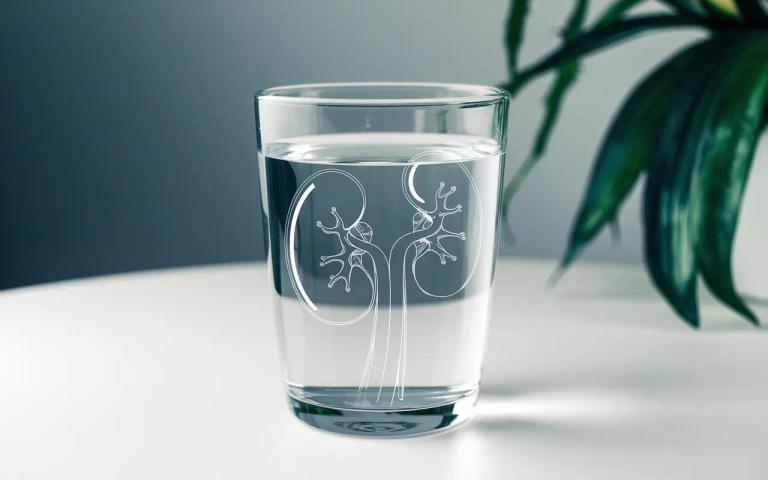Urgent signs: What your urine says about your kidney health
- Date:
- 13/02/2025
- Author:
- Maria Stringer

It's not a glamorous topic. Most of us don’t think twice about our urine—until something seems off.
Maybe you notice your pee looks darker than usual, has a strong smell, or you’re suddenly running to the toilet more often.
It’s easy to shrug off these small changes, but they can actually tell you a lot about what’s happening inside your body—especially when it comes to kidney health.
Why urine is a key indicator of kidney health
Your kidneys are like the body’s built-in filtration system, working 24/7 to remove waste, balance fluids, and regulate essential nutrients. Everything you drink, eat, and process eventually passes through them.
When they’re working well, you probably won’t notice a thing. But if something’s not quite right, your urine is often the first place signs will show up.
Changes in colour, clarity, smell, or frequency can hint at things like dehydration, infections, or even early kidney problems. That’s why keeping an eye on your urine—and knowing what to look out for—can be a simple but powerful way to stay on top of your kidney health.
What your urine may be telling you
Your urine can reveal a surprising amount your health. While colourless, odourless urine at regular intervals can signal everything's okay, changes from the norm could be a sign that something's not quite right.
Let's explore some common changes and what they might mean:
Colour and clarity:
Have you noticed a change in the colour of your urine? Here's what that might mean .
- Dark Yellow or Amber: This often indicates dehydration. When you're not drinking enough water, your urine becomes more concentrated, leading to a darker hue.
- Red or Pink: While certain foods like beetroot can temporarily tint your urine pink, a persistent reddish colour may signal blood in the urine, which could be due to infections, kidney stones, or more serious conditions.
- Cloudy or Milky: This concerning appearance can result from urinary tract infections or kidney stones; something you should act on immediately.
Smell:
If your urine has started to smell strongly or different, there may be an underlying cause to explore.
- Strong, Ammonia-Like Odour: Dehydration can lead to more concentrated urine, resulting in a stronger ammonia smell.
- Sweet or Fruity Odour: This can be a sign of uncontrolled diabetes, where excess sugar is excreted in the urine. nidirect (https://www.nidirect.gov.uk/conditions/smelly-urine?utm_source=chatgpt.com)
Frequency and volume:
Do you need to pee more or less than usual? Something might be wrong.
- Increased Frequency: Needing to urinate more often than usual can be linked to kidney disease or diabetes.
- Decreased Urination: Producing less urine can indicate dehydration or potential kidney issues.
By paying attention to these signs, you can gain valuable insights into your kidney health. If you notice persistent changes, it's essential to consult a healthcare professional for further evaluation.

The role of at-home kidney testing
Many kidney problems develop silently, without obvious symptoms until they become more serious. Regular monitoring is especially important for those with diabetes, high blood pressure, or a family history of kidney disease.
A kidney health test provides a quick and easy way to check key kidney health markers using a simple urine dipstick. By looking at three indicators – creatinine, specific gravity, and protein – these tests can give you a window into how your body's filtering system is working.
Creatinine levels – How well the kidneys filter waste
Creatinine is a waste product produced by muscles during normal activity. The kidneys filter creatinine from the blood and remove it through urine. Consistently high or low creatinine levels in urine can indicate kidney dysfunction:
- Low creatinine levels in urine may suggest that the kidneys are not effectively filtering waste, which could be an early sign of chronic kidney disease or other kidney function issues.
- High creatinine levels could indicate dehydration, as reduced water intake causes urine to become more concentrated. In some cases, it may also be linked to high protein intake or excessive muscle breakdown.
Because creatinine is filtered at a constant rate, checking its levels in urine can give valuable insight into how well your kidneys are working. If abnormalities are detected, a healthcare provider may recommend blood tests to measure creatinine clearance and confirm kidney function status.
Specific gravity – Urine concentration and hydration levels
Specific gravity measures how concentrated or diluted your urine is, giving insight into both hydration levels and kidney efficiency. The kidneys regulate urine concentration based on how much water the body needs to retain or excrete:
- High specific gravity means more concentrated urine, which can be a sign of dehydration, kidney stress, or certain conditions like diabetes insipidus or urinary tract infections (UTIs).
- Low specific gravity indicates diluted urine, which could result from excessive fluid intake, kidney dysfunction, or conditions that cause the body to struggle with water retention.
By tracking specific gravity, this test helps identify early signs of dehydration and kidney issues before more serious complications develop.
Protein levels (proteinuria) – Spot kidney disease early
Normally, the kidneys prevent large protein molecules from passing into urine. However, when kidney function is impaired, proteins like albumin can leak through, a condition known as proteinuria. Detecting protein in urine is one of the earliest indicators of kidney disease:
- Mild proteinuria can be temporary and caused by stress, fever, or exercise.
- Persistent proteinuria may indicate chronic kidney disease, high blood pressure, or diabetes-related kidney damage.
- High levels of protein in urine may also suggest kidney infections, autoimmune conditions, or cardiovascular issues.
Proteinuria is often asymptomatic in early stages, making regular at-home testing a useful tool for detecting potential kidney problems before symptoms appear. If persistent proteinuria is found, further medical evaluation is necessary to determine the underlying cause.
Put your kidney health tests in context
Since the kidneys and liver work closely together to remove toxins, issues with one can sometimes signal problems with the other. If you're monitoring your kidney health, you might also find our blog about liver health helpful in understanding how both organs contribute to overall well-being.
At-home tests make it easier to stay informed about your health, whether you're managing an existing condition or just being proactive. Explore our general health tests for more ways to track key health markers and take control of your well-being.
When to see a doctor

Monitoring your kidney health is crucial, as early detection of potential issues can lead to more effective treatment.
If you experience any of the following symptoms persistently or your tests indicate an imbalance on a key marker, always best to seek the advice of your doctor:
- Changes in urine: Persistent alterations in urine color, smell, or frequency can be indicative of kidney problems. For instance, blood in the urine, known as hematuria, may signal kidney disease or other urinary tract issues.
- Swelling (Edema): Unexplained swelling in areas such as the ankles, feet, or hands occurs when the kidneys are unable to remove excess fluid and sodium from the body.
- Fatigue and difficulty concentrating: A significant decrease in kidney function can lead to a buildup of toxins and impurities in the blood, causing individuals to feel tired, weak, and have trouble concentrating.
- High blood pressure: Elevated blood pressure is both a cause and a consequence of kidney disease. The kidneys play a vital role in regulating blood pressure, and impaired kidney function can lead to hypertension.
A healthcare provider can perform more in-depth blood and urine tests to check your kidney function and find the underlying cause of these symptoms.
As with all health concerns, early intervention can help manage the condition effectively and prevent further complications.
Listen to what your body is telling you
Your urine might not be something you think about often, but it can be one of the first ways your body lets you know when something isn’t quite right. Subtle changes in colour, smell, or frequency can be early clues about your kidney health, and paying attention to them can make all the difference.
Regular monitoring—whether that’s using an at-home kidney test or simply being more aware of what’s normal for you—gives you the power to spot potential issues early and take action if needed.
If something feels off, don’t ignore it. Your kidneys work hard for you every day—keeping an eye on them is one of the best ways to look after your long-term health.
ProductsProducts featured in this blog
View all kitsTotal Cholesterol Rapid Home Blood Test Kit
£15.00£18.00


